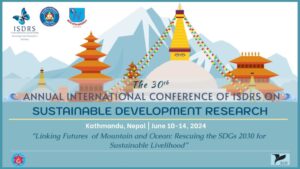Goals and Objectives of the Track
Cities and regions are of critical importance to move societies from a state of perpetual and aggravating social-ecological crises towards sustainability. The corona pandemic has contributed to further accentuate their role as spatial subjects and arenas of change to achieve a wide range of interconnected transformations e.g. in terms of land use, biodiversity, water, energy, mobility, food, built environment, health, education or digitalization, among others. Deeply entrenched systemic configurations causing multiple sustainability and justice deficits have become widely visible, illustrating the urgency of, but also resistances to, faster and disruptive societal innovation.
Urban and regional transformations are thus about such deep, path-deviant changes simultaneously affecting ecological, technological, institutional, cultural and practice dimensions within or across diverse action and knowledge domains. Research in this field has been particularly interested in unpacking how complex dynamics of place as well as relations across territories, scales and networks play out in acknowledging, questioning and ultimately reshaping current patterns of inertia or “lock-in”, connecting the above dimensions in and through spatial relations, and from the individual to collective levels.
This track aims to bring together contributions from a variety of disciplinary perspectives and global contexts to juxtapose and advance current understandings of urban and regional transformations. Authors may draw on conceptual and methodological developments or empirical studies (comparative and longitudinal ones are especially welcome). Research concerning the drivers and opportunities, the resistances and obstacles, as well as the patterns, processes and dynamics of such transformations is particularly relevant.
Individual contributions may therefore examine e.g.:
- Place-making and place-based relations considering identities or sense of place and their time-bound, socio-spatial and intersectional characteristics
- Cross-domain spatial relations linking e.g. energy/mobility/built environs/health, food/biodiversity/land use, etc.
- Multi-scalar spatial and multi-level authority relations regarding the transformation synergies or frictions they create
- Territorial and translocal relations concerning the role and influence of borders and boundaries, as well as (national or global) networks of urban and regional places
- Longer term or emerging future pathways of urban and regional transformations identified in retrospective or prospective studies (e.g. scenarios)
- Reconfiguration of socio-spatial relationships (social networks) and the impacts on sustainability transformations
Length and content of the proposed abstract to the track
Each proposed abstract of between 300 and 500 words:
- shall be organized without headlines but synthesise the contribution along a clear structure (e.g. problem/method/findings/conclusions)
- does not need to, but can include references
Potential publication channels
Full paper contributions of high quality and novelty will be considered for submission individually or as a thematic collection (special issue) in the open access journal “Urban Transformations”: https://urbantransformations.biomedcentral.com/about
Knowledge Resources
State of the Art:
Current research on urban and regional transformations covers a wide range of subjects and approaches – keywords include e.g. Leverage points; Transformative agency; Transformative capacity; Experiments; Living Labs; Transition Management; Adaptive governance; Design thinking; Social innovation; Innovation ecosystems; Transition Towns; Grassroots innovation; Biophilic urbanism; Nature-based solutions; Urban tinkering; Tactical urbanism; DIY urbanism; Social-Ecological Systems (SES); Socio-Technical Systems (STS)
Recommended Sources:
- A good overview of current research on urban system innovation is offered in this review paper
- Informed Cities is an initiative run by ICLEI Europe providing insights and network opportunities for transformative action
- The Transformative Cities platform gathers inspiring practice examples and other useful resources.
Past Conference
- Nanjing, China 2019
Our session discussed inspiring contributions on diverse leverage points that can trigger wider systemic urban and regional change for sustainability, ranging from environmental conservation to artistic action, urban design and everyday practices. The cases all addressed critical and multi-scalar sustainability challenges that human settlements are confronted with today, identifying how human agency and new forms of collaboration can make a decisive difference. See our summary here.
- Messina , Italy, 2018
- We discussed the tension field between current mainstream planning on the one hand, and pressing requirements for achieving transformative change on the other: How does research address the relation between planning and transformation? How does planning practice affect sustainability transformations? How could future transformative planning research/practice look like? See our summary here.
LinkedIn Discussions in our Topic group 6a
Recent discourses on the ISDRS LinkedIn discussion group:
Next Conference: Track 6a
Keep up to date with developments of ISDRS 2024 Track 6a here
“Linking Futures of Mountain and Ocean: Rescuing the SDGs 2030 for Sustainable Livelihood“
Who are we?
Leibniz Institute of Ecological Urban and Regional Development, Dresden. m.wolfram@ioer.de
National Taiwan University, Taipei. liling@ntu.edu.tw
National Taiwan University. jouchen@ntu.edu.tw
Hong Kong Baptist University. daphnemah@hkbu.edu.hk
